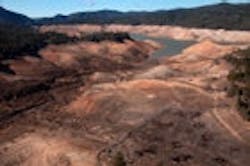Los Angeles Mayor Warns of Water Restrictions, Rate Hike
An ongoing drought has prompted Los Angeles Mayor Antonio Villaraigosa to call for increased water restrictions and the implementation of a tiered water rate that would punish customers who do not conserve water, the Los Angeles Times reported.
Under the proposal, sprinkler use would be restricted to two days per week, and could be cut to one day per week by summer if the drought continues.
The restrictions and rate changes could be in place by spring if approved by the city council and DWP, the newspaper reported.
"The level of severity of this drought is something we haven't seen since the early 1970s. We have to move quickly to address this problem," Villaraigosa said at a news conference at City Hall.
"What is being delivered here today is grim news indeed. What is being announced is, in effect, water rationing for the first time in the history of the city of Los Angeles," H. David Nahai, DWP's general manager, said.
The precise effect of rationing on DWP customers is currently unclear. DWP customers probably would be asked to cut water use "in the double digits and it could be as high as 15 to 20%," Villaraigosa said.
"The vast majority of people will actually save money if they comply to reduce their water use . . . those who don't will be penalized," Villaraigosa said, adding that the DWP also will expand its financial aid program for low-income families.
The DWP commissioners will consider the proposal Feb. 17, Nahai said.
"We're going to have to do a great deal of outreach and education to the public. We don't want anybody to be caught unaware and suddenly see their bill go up," Nahai said. "Remember, the idea here is not to increase revenue to the department, it's to encourage conservation."
Customers may still face a separate water-rate increase later this year if the Metropolitan Water District (MWD) raises its wholesale rates, according to the newspaper.
MWD General Manager Jeffrey Kightlinger said the drought and the reduction in water supplies have forced his agency to buy "more expensive water."
"We have to charge what it costs, and we have to go out and get that water," Kightlinger said. "We can't say, 'Sorry, we're not going to deliver water for the next few months because it's so expensive.' "
Source: Los Angeles Times
